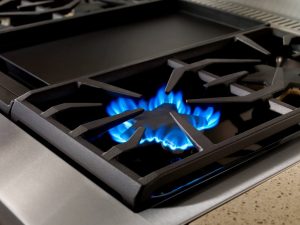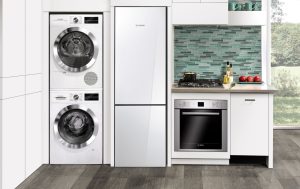Understanding Energy Efficient Appliances

Choosing energy efficient appliances is a sensible decision. Not only will these appliances save money on your energy bills each month, but you can also do your part for the environment. Unfortunately, many consumers find themselves feeling confused about energy efficient appliances, so here we’ll explore what you need to know.
The Energy Star Basics
The first thing you need to know is to look for the Energy Star mark and what this means. The Energy Star program is offered by the Environmental Protection Agency, and it is designed to help you make smarter decisions when powering your home. The Energy Star logo is easy to recognize, but you also need to know what all the information on those labels actually means.
An Energy Guide label is designed to provide a roundup of all the features and costs associated with the appliance. This label will let you know how much energy this appliance will use and an estimate of what this will add up to on your energy bills. Only products with the highest efficiency standards are awarded the Energy Star logo, so this is a great place to start shopping.
An Efficiency Guide
There are a number of factors to consider when you choose a new appliance. You not only need to look at the space available for your new appliance, but also your usage needs and the features you’d like. There is no sure way to determine that this model is better than another, as a tiny refrigerator may be highly efficient compared to a large model, but not helpful if you have a family of six.
Rather than looking for the highest possible efficiency, you need to look at your requirements and use resources such as the Energy Star comprehensive guide to determine the most efficient options for you.
Gas vs. Electric
If you are concerned with optimum efficiency, you also need to compare gas versus electric. This efficiency metric does depend on personal preferences, but natural gas does tend to be cheaper. Although the rates vary in different states, you can expect to save up to 30% compared to electric. Unfortunately, there is a downside, as gas appliances tend to cost up to 20% more initially.
Higher Initial Cost vs. Long-Term Savings
The cost of energy-efficient appliances has come down in recent years in response to the higher demand for Energy Star appliances. This means that you should find energy-efficient appliances competitively priced, but there may still be a little more to pay initially. This means that you will need to assess the higher initial costs compared to the long-term savings. You need to think about recouping the additional expense in the months and years of use. While it may seem more costly to spend several hundred dollars more, if you can save 20 or 30 dollars each month, you will recoup this in no time at all, then enjoy savings for the remainder of the appliance lifespan.
Is it Time to Upgrade?
If you currently have older appliances, you may have wondered if you should upgrade now or wait for the appliance to fail completely. Of course, this will depend on your personal financial situation, but it is essential to consider the ongoing costs of running an older, less efficient appliance. Even if your appliance offered fantastic efficiency when you purchased it, energy efficiency technology continues to develop at a rapid pace. This means that a brand new energy efficient appliance is likely to cost a fraction to operate. So, while you will need to cover the cost of the new appliance, you need to look at how dramatically your energy bills may drop.
If you’re thinking about upgrading to new energy efficient appliances, you can explore your options with this online collection. If you need more specialist service or further help, be sure to speak to a home appliance expert.
- Designing the Ultimate Outdoor Bar: Must-Have Appliances for Year-Round Fun
- Luxury Refrigerator Guide 2025: Built-In vs. Freestanding and What to Know Before You Buy
- How Smart Appliances Are Changing Luxury Kitchen Design in 2025
- The Ultimate Outdoor Grill Guide for 2025: Built-In vs. Freestanding
- Smart Bathroom Faucets & Fixtures in 2025: Blending Technology with Luxury Design
- Built-In Coffee Machines: Are They Worth It for Your Kitchen in 2025?
- How to Choose the Right Dishwasher for Your Home: Noise, Capacity, and Features Explained
- Top 5 Kitchen Appliance Colors and Finishes for 2025 (And How to Match Your Style)
- Why a Countertop Ice Maker is a Must-Have for Summer Kitchen Upgrades in Southern California
- How to Remove Scratches from Stainless Steel Luxury Appliances






